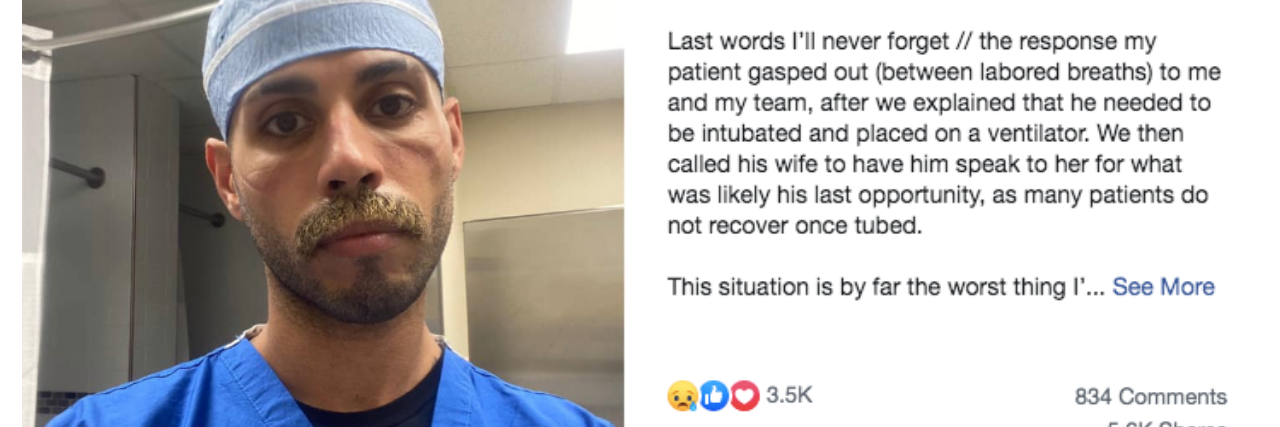COVID-19 Patient's Heartbreaking Question Shows the Problem With U.S. Healthcare
Editor's Note
This story reflects an individual’s experience and is not an endorsement from The Mighty. We believe in sharing a variety of perspectives from our community.
On April 3, medical worker, Derrick Smith, wrote a heartbreaking Facebook post about a COVID-19 patient’s last words before being intubated and hooked up to a ventilator.
“Who’s going to pay for it?” this individual gasped between labored breaths.
Smith called the situation the “worst thing [he’d] witnessed” in his 12 years of working in critical care and anesthesia. The post, which has since gone viral, with 830+ comments and 5,600 shares, underscores the need for single-payer healthcare in the United States.
You can see the full post below:
“Who’s going to pay for it?”
Last words I’ll never forget // the response my patient gasped out (between labored breaths) to me and my team, after we explained that he needed to be intubated and placed on a ventilator. We then called his wife to have him speak to her for what was likely his last opportunity, as many patients do not recover once tubed.
This situation is by far the worst thing I’ve witnessed in my collective 12 years of critical care & anesthesia. Next-level heartbreak = having to hear a dying patient use his last words to worry about healthcare finances.
This country is truly a failed state, and it’s so sickening to witness firsthand, more blatantly than ever.
Regrettably, Smith’s patient was getting treated for COVID-19 in a healthcare system ill-equipped to deal with it. United States legislators should use Smith’s viral post as a wake-up call and guarantee of improved and expanded Medicare For All.
No American should be in critical care wondering how their family is going to pay for their care, but this is a reality under the current U.S. healthcare system, which is largely privately-funded and privately-delivered. For-profit health insurers act as amoral middlemen in a scheme which, according to an academic study published in the American Journal of Public Health in 2019, bankrupts some 530,000 people a year and accounts for 66.5 percent of all chapter 11 bankruptcy filings.
The need for the United States to pass the Jayapal-Sanders Medicare For All legislation in Congress is personal for me. Since my diagnosis with physical and mental illness in 2004, my family has paid over $400,000 out-of-pocket for my medical appointments and prescription drugs. One might assume my situation has culminated in our bankruptcy, but luckily that wasn’t the case for my family. My great-grandfather and grandfather owned a chain of retail stores, and financial privilege is the only reason we have escaped losing everything. While my parents and I are not multimillionaires, the for-profit nature of the American healthcare system has even put a strain on our finances. Like most Americans — and Smith’s patient — the question “Who’s going to pay for it?” was an added burden to my already stressful and hard-to-manage medical conditions.
After the passage of the Affordable Care Act, what is popularly called Obamacare, one might assume the situation has gotten drastically better, both for the country and for me personally. But the aforementioned 2019 academic study demonstrated no difference in the number of medical bankruptcies after the implementation of the Affordable Care Act. While the research did discover gains from the legislation, Obamacare has never been the answer to the dysfunctionality of the American healthcare system.
When I see posts like this and think about my own situation, one thing is clear: as long as the United States remains beholden to for-profit insurance companies, nothing will change since the industry has the best lobbyists and attorneys that money can buy. Our country can and should provide universal, comprehensive and affordable healthcare.
If the larger public learns anything from Smith’s Facebook post, it should be that “Who’s going to pay for it?” is the wrong question to be asking about healthcare, both on an individual level and for American public policy.
Instead, the question we should be asking is who’s going to pay for it if we continue to accept patchwork solutions, if rural hospitals keep closing and if we don’t have enough hospital beds in a healthcare crisis. As the U.S. crosses 10,000 COVID-19 casualties with no end in sight, the answer to this fundamental question is that we are all going to pay for it.
Concerned about coronavirus? Stay informed with these articles:

